Massachusetts has a variety of duck hunting from the coastal marshes to many Wildlife Management Areas. With some careful planning and some luck, you can make this year’s hunt a success. Whether you are a novice hunter or an experienced veteran, here is everything you need to know about duck hunting season in Massachusetts, including season dates, bag limits, and more!
What Kinds of Ducks live in Massachusetts?
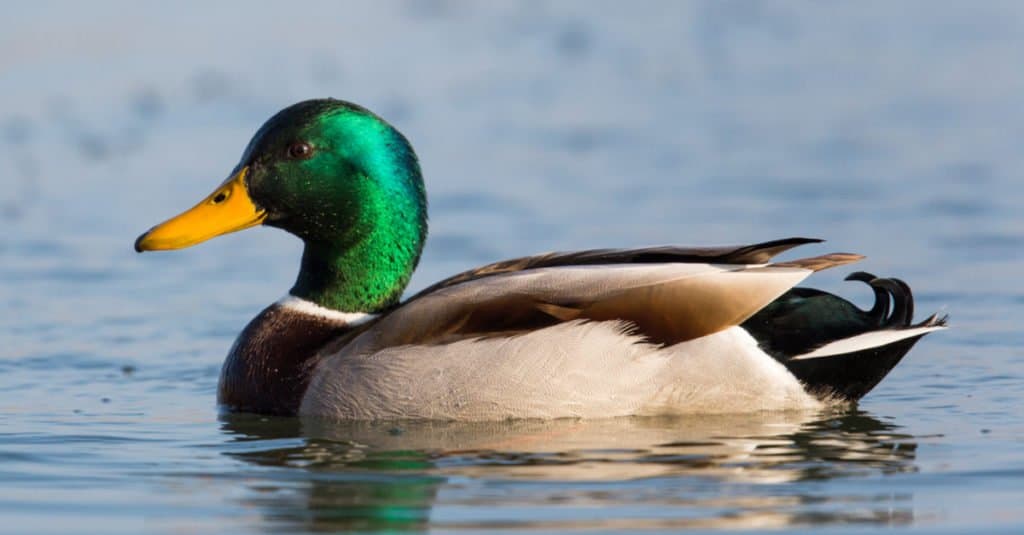
The most popular duck in Massachusetts is the very recognizable Mallard with its emerald green head and bright orange beak.
©Pascal Halder/Shutterstock.com
There are a variety of ducks and waterfowl that live in Massachusetts. The most popular is the very recognizable Mallard with its emerald green head and bright orange beak. According to the U.S. Fish and Wildlife Service, the top three harvested ducks in Massachusetts are the mallard, common eider, and wood duck. Here are some of the other ducks and waterfowl you can find in Mass.:
- Mallard
- Common Eider
- Wood Duck
- Sora Rail
- Virginia Rail
- Snipe
- Woodcock
- Ducks
- American Coot
- Mergansers
- Regular Goose
- Canada Goose
- Snow Goose
- Blue Goose
- Brant
- Sea Ducks
Where can you Duck Hunt in Massachusetts?
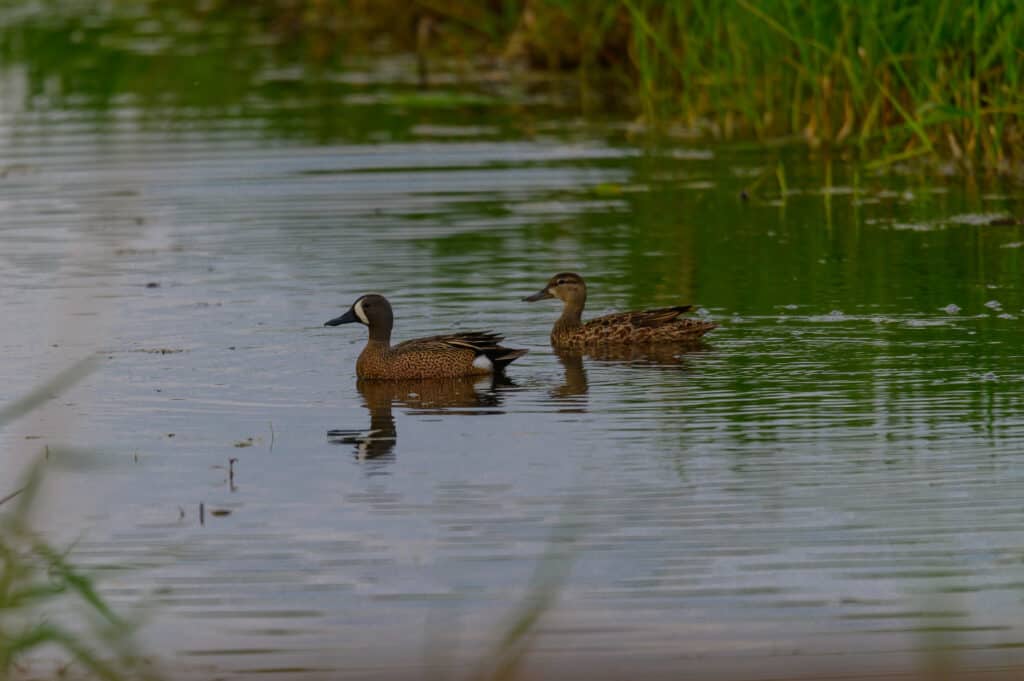
Public hunting is allowed in the Wildlife Management Areas (WMA) and Wildlife Conservation Easements (WCE).
©James W. Thompson/Shutterstock.com
You can duck hunt in one of three zones in Massachusetts. The Berkshire Zone is the western third of the state, the Central Zone is in the middle, and the Coastal Zone is along the coast. There is one exception in the Coastal Zone, with the southern part being off-limits to the late goose season.
Public hunting is allowed in the Wildlife Management Areas (WMA) and Wildlife Conservation Easements (WCE). The Parker River National Wildlife Refuge has excellent conditions for duck hunting. With 3,000 miles of coastal marshes, you can see why this is a favorite place for ducks to stop on their migrations south.
What are the Season Dates?
| Species | Season Dates |
|---|---|
| Sora Rail | Sep. 1 – Nov. 7 |
| Virginia Rail | Sep. 1 – Nov. 7 |
| Snipe | Sep. 1 – Dec. 16 |
| Woodcock | Oct. 1 – Nov. 22 |
| Ducks | |
| Berkshire Zone | Oct. 10 – Nov. 26 Dec. 19 – Jan. 7 |
| Central Zone | Oct. 10 – Nov. 26 Dec. 27 – Jan. 16 |
| Coastal Zone | Oct. 15 – Oct. 22 Dec. 1 – Jan. 31 |
| American Coot | Same as ducks |
| Mergansers | Same as ducks |
| Regular Goose (except Snow and Blue) | |
| Berkshire Zone | Oct. 10 – Nov. 12 |
| Central Zone | Oct. 10 – Nov. 26 Dec. 27 – Jan. 16 |
| Coastal Zone | Oct. 15 – Oct. 22 Dec. 1 – Jan. 31 |
| Early Canada Goose (Statewide) | Sept. 2 – Sept. 24 |
| Late Canada Goose | |
| Berkshire Zone | Dec. 15 – Feb. 15 |
| Central Zone | Jan. 18 – Feb. 15 |
| Northern portion of Coastal Zone | Feb. 1 – Feb. 15 |
| Snow and Blue Goose | Same as ducks |
| Late Snow and Blue Goose | |
| Central Zone | Jan. 18 – Feb. 15 |
| Northern Coastal Zone | Feb. 1 – Feb. 15 |
| Sea Ducks | Same as ducks |
| Brant (Coastal Zone only) | Dec. 1 – Jan. 27 |
Other Season Dates
| Falconry (Ducks and Coots only, no geese) | Oct. 1 – Feb. 2 |
| Youth Waterfowl Hunt (Statewide) | Oct. 8 and Feb. 4 |
| Active Military and Veteran Waterfowl Hunt (Statewide) | Oct. 8 and Feb. 4 |
What are the Bag Limits and Possession Limits for Duck Hunting in Massachusetts?
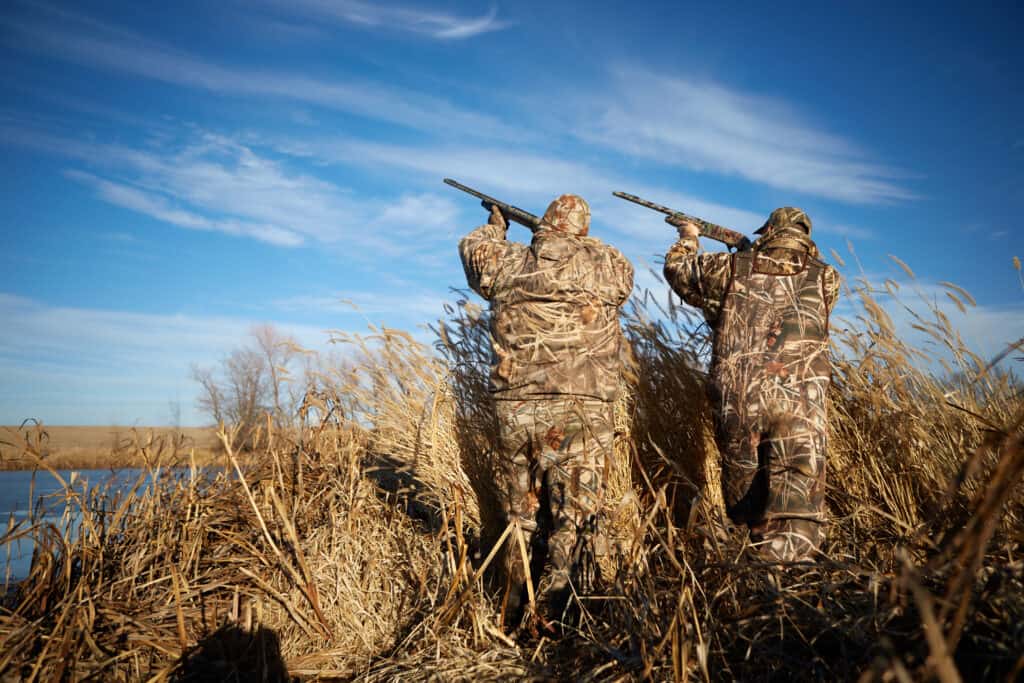
The daily bag limit for ducks is six in Massachusetts.
©CLP Media/Shutterstock.com
The daily bag limit for ducks is six in Massachusetts, either singly or in the aggregate (group). Note that there is a change this year in the number of sea ducks you can take from five down to four. Also, note that sea ducks are included in the total six-duck daily bag limit. Here are the bag limits and possession limits for all the migratory game birds:
| Species | Bag Limits | Possession Limits |
|---|---|---|
| Sora Rail | 5 | 15 |
| Virginia Rail | 10 | 30 |
| Snipe | 8 | 24 |
| Woodcock | 3 | 9 |
| Ducks | 6 | 18 |
| American Coot | 15 | 45 |
| Mergansers | 5 | 15 |
| Regular Goose (except Snow and Blue) | ||
| Berkshire Zone | 1 | 3 |
| Central Zone | 2 | 6 |
| Coastal Zone | 2 | 6 |
| Early Canada Goose (Statewide) | 15 | 45 |
| Late Canada Goose (all Zones) | 5 | 15 |
| Snow and Blue Goose | 15 | 45 |
| Late Snow and Blue Goose | ||
| Central Zone | 15 | 45 |
| Northern Coastal Zone | 15 | 45 |
| Sea Ducks* | 4 | 12 |
| Brant (Coastal Zone only) | 2 | 6 |
*Note that sea ducks are now included as part of the 6-duck daily bag limit
| Other Seasons | Bag Limits | Possession Limits |
|---|---|---|
| Falconry (Ducks and Coots only, no geese) | 3 | 9 |
| Youth Waterfowl Hunt (Statewide) | Same as regular season | |
| Active Military and Veteran Waterfowl Hunt (Statewide) | Same as regular season |
What are the Hunting Hours?
The hunting hours in Massachusetts are the same across all zones. Check this link to find the official sunrise and sunset times, NOAA sunrise and sunset times. Be sure to plan ahead for your hunt and save plenty of time to get your boat or blind all set up. Leave time to scope out the perfect location and set your decoy spreads. Always be cautious of fellow hunters and leave appropriate space between blinds and hunting locations.
- Hunting hours begin a half hour before sunrise and end at sunset.
- During early goose season, hunting can begin a half hour before sunrise and end a half hour after sunset.
- On WMA land stocked with pheasant or quail during pheasant and quail season, hunting can begin at sunrise and end at sunset. Pheasant season is Oct. 1 – Nov. 26, and quail season is Oct. 15 – Nov. 27.
Gear Up! What Gear do you Need for Duck Hunting Season in Massachusetts?
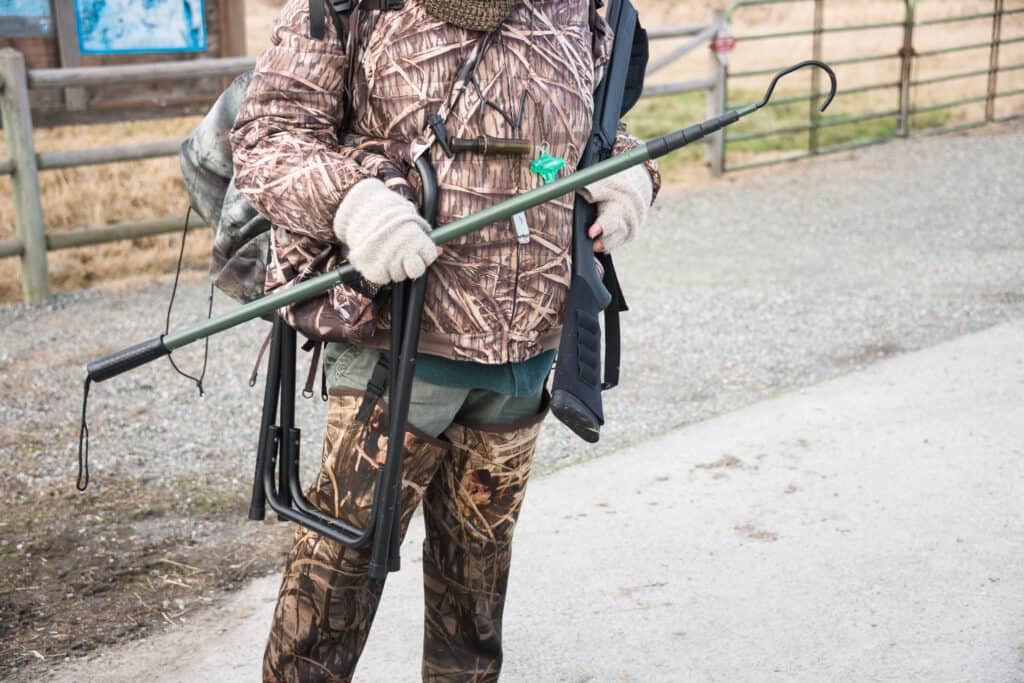
After you have been out for a few hunts, you can always tweak your gear or add more gadgets.
©Denise Lett/Shutterstock.com
Depending on your preferred type of duck hunting, there are some basic gear requirements that make for a successful hunt. After you have been out for a few hunts, you can always tweak your gear or add more gadgets. Experimenting with different decoy spreads, callers, and blinds is what makes this sport so intriguing.
- Your shotgun is the most essential gear you’ll need, and if you started a thread of “The best shotgun for duck hunting is…” you would get some strong opinions across the board. Again, try what works for you, and you’ll find the best fit for your style and the type of waterfowling you love.
- Gun case or bag to keep moisture away from your gun
- The right shells (depends on the size of the bird and distance)
- Duck blind or boat blind: Three words… scout it out. Take time to scout the area you plan to hunt so you can learn the rhythm of the birds you are targeting. Take time to visit the spot you want to hunt days before your hunt. There are a variety of blinds and boat blinds to try, but be sure to get one that fits in with the conditions you plan to hunt. If you will be sea duck hunting along the coast, take into consideration the high winds that are often present. Think “sturdy” when looking into your blind setup.
- Decoys: It depends on the species you are after, but a dozen or so decoys is a good start. Know your species to know if you should have bubblers and mojos, or if you should have a quiet inviting setting.
- Camo: Remember ducks have an aerial view, so it is very important to blend in with your surroundings. Everything should be camouflaged to match your blind, including your face. Face paint or a camouflaged gator is essential to blending in.
- Duck callers: If you are targeting one species, then you only need one duck caller, but many hunters will have a string of callers to adapt to different species. Practice your calls and know your waterfowl so you can attract the ducks you want to your location. While you can certainly listen to a YouTube video on duck calling, be sure to do it before you get to your blind. You are not allowed to use electronic callers of any kind to attract ducks.
- Waders: You absolutely have to have a sturdy pair of waders. Either one-piece waders with built-in boots or separate stocking foot waders paired with boots. Think about if you are hunting early in the season and have to deal with heat and bugs or later in the season when you need to layer up for warmth.
- Dog: Many duck hunters in Massachusetts enjoy hunting with their dogs. It is very rewarding to see your well-trained dog enjoying the retrieval. Be sure to have the supplies you need to care for your dog for the duration of your trip. Think about food, clean water, leash, place board (if you have taught them to “place”), and towels.
- Thermacell: Not on every hunter’s list, but for the early season or for hunting in late September, it doesn’t hurt to have a Thermacell mosquito repeller.
- First Aid Kit: Always have a first aid kit handy. Think about safety for both you and your dog if you bring one. Remember, the bottom of lakes, ponds, and the coast can be littered with debris and dangers, so be prepared for accidents.
Factors for Success
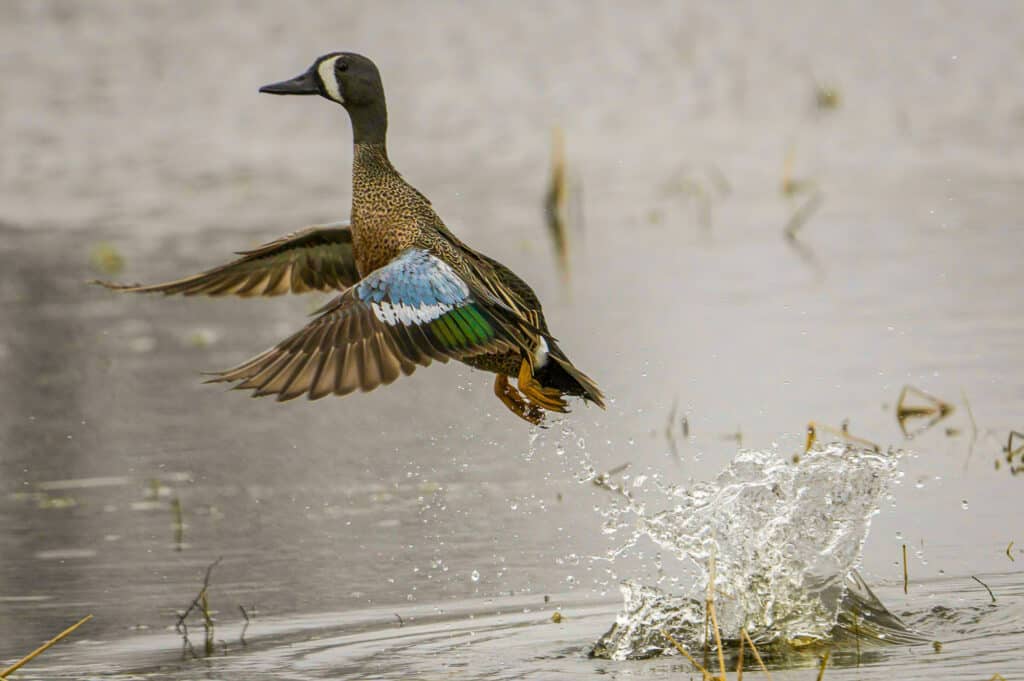
Do your homework and scout out the best location.
©iStock.com/Brian Reinke
You can control some things when planning for a duck hunting trip, other things are out of your control. With proper planning, you can increase your chances for a successful trip. Three of the biggest factors for success include:
- Blind: Choosing the location of your blind is one of the key factors to success. Do your homework and scout out the best location. Really take the time to make your blind blend in with its surroundings. Even if you think it is camouflaged enough, rethink about adding more brush or branches.
- Decoy Spread: Experiment with different setups. Know the species you are tracking to figure out the best spread. Put up some mojos (decoys on a pole that have moving wings) to attract mallards, teals, gadwall, or pintails, but floaters seem to work fine universally with most species. Some duck hunters will add a half-dozen geese to their spread to create some realism. Do what works for you!
- Weather: This one you can’t control, but you can try to adapt to the weather. Most duck hunters recommend cool, wet conditions with overcast skies. Be sure to dress accordingly so that your trip is not cut short due to frigid hands or a cold head.
Where are the Best Places to Duck Hunt in Massachusetts?
Massachusetts is along the Atlantic Flyway for migratory birds. There are several popular WMAs that hunters prefer, while other hunters try to find more remote areas for hunting. The Parker River National Wildlife Refuge on the northeastern coast has 3,000 acres of salt marshes for some of the best hunting. You can find an interactive map to hunting locations here.
Meet the Species: 4 of the Most Common Ducks in Massachusetts
- Mallards: Probably the most popular duck species around, the male mallards have an emerald green head and a yellow bill. Their bodies are black and white with green tail feathers.
- Eiders: This sea duck is the largest duck in the northern hemisphere. Their bodies are a mix of dark black contrasting against white feathers. The heads are mostly white, with the top and sides being black. The yellow of the beak extends up the front of the head.
- Scoters: Another sea duck, these are all black except for a unique design on their heads. There is a white splotch behind its head, one between its eyes and under the beak. The tip of the beak is yellow with a hint of red/orange.
- Long-tails: The long-tail is a smaller sea duck that has a very long black tail feather. They have a fluffy white head and a mix of black offsetting white feathers.
Up Next
- The 12 Biggest Lakes in Massachusetts
- Discover the Deadliest Animals in Massachusetts
- 10 Incredible Duck Facts
The photo featured at the top of this post is © Marta Fernandez Jimenez/Shutterstock.com
Sources
- , Available here: https://www.gameandfishmag.com/editorial/new-england-duck-hunting-prospects-2017/192131
- , Available here: https://www.mass.gov/info-details/migratory-game-bird-hunting-regulations
- , Available here: https://www.mass.gov/doc/2022-2023-migratory-game-bird-regulations/download
FAQs (Frequently Asked Questions)
Can you duck hunt in Massachusetts?
Yes, duck hunting is allowed in Massachusetts. Waterfowl hunters must have a hunting license, Federal Duck Stamp, and HIP certification.
When does duck hunting season start in Massachusetts?
Game birds like the Sora rail, Virginia rail, and snipe open on September 1, 2022. Duck season opens October 10, 2022, in the Berkshire and Central Zone and Oct. 15, 2022, in the Coastal Zone.
What are the most common ducks in Massachusetts?
The most common ducks hunted in Massachusetts are the mallard and sea ducks.
What is the bag limit for mallard ducks in Massachusetts?
The daily bag limit for mallard ducks is six.
Thank you for reading! Have some feedback for us? Contact the AZ Animals editorial team.






